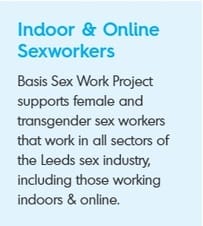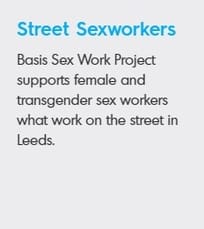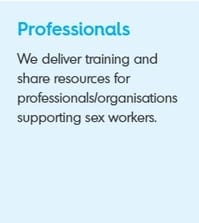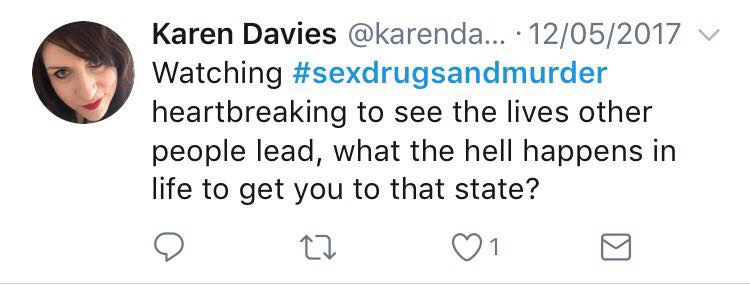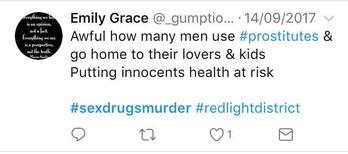 The final episode of the BBC3 documentary, Sex Drugs and Murder, is out (finally!) and at Basis we’re mightily relieved to see the end of the program – 18 months since they first came into the Leeds' managed area. When research conducted by the University of York in 2014 found that sex workers in Leeds were not reporting violent crimes to the police, Leeds City Council, the West Yorkshire Police, and support groups came together to pioneer a new approach to street sex work and sex worker safety. For over ten years, the street sex workers of Leeds have operated in the Holbeck district of the city and no attempt at abolishing this has worked. The 2014 ‘Managed Approach’ meant that within this area, between the hours of 8pm and 6am, there would be no police prosecutions for soliciting or selling sex. A dedicated police sex work liaison officer was brought in, as well as an increased police presence. Local and national charities that support sex workers, like Basis and National Ugly Mugs, were able to offer training to police and sex workers in reporting crimes and staying safe. The Joanna charity opened an outreach centre in Holbeck, offering support and advice for those who needed it. And, what’s more, the scheme works. Under the new approach there has been a tenfold increase in crimes against sex workers reported to police, and conviction rates increased dramatically. But, it has not been easy to achieve. Making the managed approach work is an extremely delicate process that has to continually balance the needs of vulnerable people, the rights and concerns of the residents, and the interests of local authorities. Basis are extremely concerned about the impact of the BBC's documentary series is having on this process. Basis Yorkshire was set up to support sex workers across Leeds in 1989. Over that time, we have worked closely with sex workers across the sex industry to provide safety, information and support to women and young people who need it. We believe the BBC documentary 'Sex, Drugs and Murder; Life in the Red Light Zone’ has done a great deal of damage to the stereotypes of sex workers in Leeds (and across the country) by portraying the women in a highly sensationalist, voyeuristic way. The footage often none-to subtly focuses the shot on drug paraphernalia and rubbish in their home, or the area they work in - giving deliberately unpleasant, grubby feel to the program and the women that are featured. This all feeds into the unjustified, but very real, stereotypes that we know place sex workers at serious risk of harm – the hashtag #stigmakills exists for a reason. The program could have been made about a group of women with complex needs and had the same content – but by adding the label of 'sex workers', it becomes more sensationalist and attracts more viewers. The documentary focuses only on women who have severe addiction issues, or on complex, even at times violent, social situations, rather than allowing viewers to see the diversity of women we work with (or indeed the diversity of the lives of the women they chose to film). Pehaps what is most troubling from an ethical position is that the documentary team behind this series paid cash to vulnerable people to appear on film. Offering cash on the streets to individuals who are desperate for drugs is hardly ethical journalism, and certainly not dignified human interaction. Given the deeply complex needs and often chaotic lives of the people being filmed, it is hard to understand how the BBC believes exposing their lives to an audience of millions to critique is going to help. Many of our service users, in fact, told us they had stayed well clear of the filming, and although most did they were upset by the footage nonetheless.  Basis complained directly to the documentary team when we felt the footage posed a significant safeguarding risk – a risk the BBC admitted they were willing to accept as the women had “consented” to be filmed (we suspect viewing figures had something to do with it as well). In a few cases, after much insistence, complaints were taken into account. When the women complained on their own they told us this often didn’t have the same effect (they were still being called on to take part in the filming, even after expressing a wish to stop). Even when we complained on their behalf, the film crew still insisted on going to talk to them about the decision to withdraw first, but without any kind of intermediary being present. The women then would often end up agreeing to take part again. This is not surprising as they are often extremely vulnerable and were being offered cash to be filmed. From our side, we informed women of the risks as best we could, but we understood why they would agree in the end. Why not? An opportunity to talk about your life, a distraction, some cash in your hand, yet at the same time they were being exploited all over again. Their lives are being sold as evening entertainment, with the deeply painful and traumatic events they recounted, no doubt adding to the excitement of watching poor people struggle with addiction and homelessness. The health and well being of our service users is our priority. Because of the obvious safeguarding issues here, we were often unable to disclose information we held as we’d be breaching confidentiality of the women we support. We will sometimes risk breaching confidentiality for safeguarding reasons with other agencies, but we were unconvinced the production team could be trusted with the information we held. For the same reasons, we couldn’t hold the BBC to account publicly – telling people the real stories behind the footage or the consequences of taking part would be inappropriate if not dangerous. It was also important that the women being filmed did not worry that we were judging them in any way for taking part as this would severely compromise the trust they place in us and risk their withdrawing from support services. In some cases, the filming severely disrupted relationships and interventions that we, and other agencies, were trying to get the women to engage with; interventions that are there to help those who need them recover from addiction, access mental health care or support someone in a housing crisis. Not only has the work done to create support systems for our service users been compromised, but by giving the women being filmed cash in hand, the production team have knowingly created a financial dependency, with limited boundaries in place. Now this extra revenue is gone and we are having to support women in learning to do without it, in none destructive ways. As always we will be there to support them through this. Complaints about misuse of incorrect data have been wilfully ignored. A few times, the team would call us if they were worried about one of the women - mostly this was due to situations that would not have existed had it not been for the filming in the first place. The documentary has shown women being under attack in their own homes, shortly after being assaulted and both rattling from drugs and whilst high. The lack of anonymity offered by the program can pose severe consequences for sex workers – we hope it won’t, but the risk has significantly increased and will continue as long as this footage is out there. From the BBC’s perspective this is clearly a risk they are willing to take – in response to our and others' (such as the International sex work research hub) official complaints, the BBC they have justified this as a 'public service'. Judging from the comments on social media and other sources, I question what public service the program actually serves (and why were twelve episodes needed to do so? The area of Leeds the BBC filmed in has seen much greater attention than previously was the case, even after the period of press interest following Daria Pionko's tragic murder in Dec 2016. Members of the general public are now going 'slumming' around the Leeds' managed area, as if Holbeck were some kind of human safari. People are driving through the area to see for themselves, they are asking for selfies, filming the women, making fun of or shouting abuse at the women or worse. Watching the women on film has created the illusion that people 'know' them and has led to some well-intended support initiatives without any form of safeguarding or knowledge of the area which has the potential of doing more harm than good (not only to the women, but to the people trying to 'rescue' sex workers). Outreach workers have even reported good Samaritans wandering around offering to buy the women cigarettes or food. Basis and other support organisations have spent nearly thirty years building relationships with the sex workers of Leeds and creating safeguarding procedures to protect our service users. People with addiction issues, mental health issues and highly complex needs are not a tourist attraction. Higher levels of harassment and car fulls of people driving around gawking are having a severe impact on the future of the managed approach. Members of the public wandering around the managed area trying to chat to the women selling sexual services because they've seen them on TV creates a potentially dangerous situation for everyone involved. We suspect this may well have been one of the reasons why some women are no longer sticking to the boundaries of the managed approach, which is a threat to its existence and something we have always been worried about. The last program claimed that the managed area has been made permanent – we would say its being reviewed all the time and constantly under threat. Making the managed area work for sex workers and residents alike is an extremely delicate process and has not been helped by programs like these –which ultimately places the women more at risk. We are frequently asked why we did not take part in the filming. I hope this article makes it clear why we would not want to go anywhere near the program. Its taken up precious time away from interventions with the women, fundraising etc. and high levels of frustration, concern and stress among the women and our staff– not to mention time and resources by the police and other public services.
We were indeed asked on numerous occasions by the BBC to take part up until a few weeks ago but have always declined and recommend others to do the same. We will continue to engage with more responsible media so the diverse range of women’s voices continue to be shared in a safe and responsible way (although even that is now much harder due to this program). This is particularly important as the debate about the managed approach continues.
7 Comments
Balaji Umapathi
10/11/2017 10:01:10 am
The article is beautifully written. I am amazed by the efforts and commitment of basis for this long. BBC's approach and execution had been terribly wrong and it is indeed midless sensational journalism. But when given a chance to get involved, basis could have atleast set the tone of the documentary and could have ensured decency and compassion in their approach in addition to not portraying them in bad light. I wish you get all the support that is required.
Reply
Amber
10/11/2017 11:58:16 am
Response from Basis : we talked to the team repeatedly through extensive discussion about what we thought was responsible and ethicall, what our specific concerns were but their boundaries of acceptability and riskremained far aligned from where we were, right from the start and remained so throughout, our involvement had little effect, if it did I dread to think what would have come out if this was an improvement.
Reply
John Williams
10/14/2017 10:22:57 pm
Having watched all the series, I feel that some of it was certainly sensationalist but overall the humanity of the women involved came through.
Reply
Kate Lister
10/15/2017 11:18:50 am
Basis have campaigned for the rights and welfare of these women for almost 30 years. They have tirelessly worked to dismantle stigma and challenge false negative images of those in the sex industry. To suggest they need to do more of what they have been doing for the last 28 years, because exploitative arseholes wandered around Leeds with a camera, is ridiculous. The issue is not how Basis will turn 'the negative into something positive, ethical and respects the safeguarding issues of the women' (because they do this every single day), but on why their work was jeopardised in the first place.
Reply
Gemma Scire
1/2/2018 10:01:19 am
Some very supportive comments in here,so thank you good people. In answer to the suggestions that we should have done more.....
Reply
1/13/2018 06:24:22 am
Wonderful, heartfelt and insightful response Gemma. The prioritising of Basis frontline services is obvious to some but many organisations lose their grass roots approach. I've seen so many become corporate and lose their community touch. Basis has remained organic, hands on and ultimately it's the practical help that is effective, making further more complex interventions a touch easier. Good on you and your team for being able to step back and see what is important. BIG hug! Keep at it.....
Reply
Leave a Reply. |
